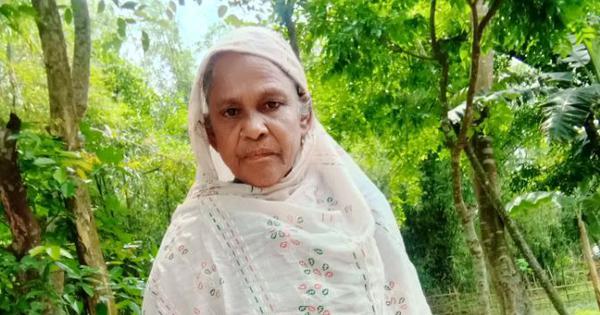Family discovers Sakina Begum’s whereabouts after she was missing following police detainment.
A 68-year-old woman from Assam, identified as Sakina Begum, has been located in Dhaka, Bangladesh, after being missing for four months. Her family received confirmation of her whereabouts from a BBC Bangla team, which found her in the Mirpur area of Dhaka. Sakina Begum, a resident of Sonpur village in Nalbari district, was among numerous individuals taken into police custody during a crackdown on declared foreigners in May.
Declared foreigners are generally long-term residents who have not been able to prove their Indian citizenship to the state’s foreigners tribunals. Many of those detained during the May operations were reportedly forced across the border into Bangladesh, often under duress. Families of the detainees learned about their loved ones’ fates through videos that surfaced online showing them in Bangladesh. Sakina Begum’s family, however, struggled to locate her for four months, even after visiting the Matia detention center on three occasions, where they were informed that she was not there.
Her daughter, Rasia Begum, expressed deep concern, stating, “We did not have any contact with her after the police took her away.” They eventually learned about her situation when a news team facilitated a video call, revealing that Sakina was indeed in Bangladesh. The BBC Bangla crew had been alerted by local residents in Mirpur, where they discovered Sakina in distress outside a shop. They provided her with shelter and support.
The family is now faced with the challenge of bringing Sakina back from Bangladesh. Rasia highlighted their financial struggles, saying, “We are poor people living on daily wages…how will we bring her?” She expressed her anguish over the situation, noting that they have been deeply troubled since discovering her whereabouts. The family has already sold their land to fund their legal battle regarding her status.
Rasia maintains that her mother is an Assamese woman, emphasizing her lack of understanding of the Bangla language. Sakina belongs to the Garia Muslim community, which has been recognized as indigenous to Assam by the current state government. Despite being declared a foreigner by a tribunal in 2012, Rasia insists that her mother is a citizen of India. Sakina was previously held at the Kokrajhar detention center for five years before being released in 2019 under a Supreme Court directive.
Rasia alleges that her mother was called to the police station under false pretenses shortly before her detainment. A public interest litigation was filed by the All BTC Minority Students Union, which claims that 21 Muslims went missing in Assam after being detained. The Assam home department, in response to the litigation, stated that Sakina Begum had been handed over to the Border Security Force (BSF) on May 26, indicating that she was forced into Bangladesh. The family only confirmed her situation through a conversation facilitated by the BBC team.
Critics, including Taison Hussian of the ABMSU, have raised concerns about the treatment of Muslims by the Assam government, alleging systemic injustices within the foreigners tribunals. Sakina’s case highlights broader issues regarding citizenship and the rights of individuals declared as foreigners. The tribunal has been criticized for its arbitrary decisions, often leading to individuals being labeled foreigners due to minor discrepancies or lack of documentation.
Despite the tribunal’s ruling, Rasia insists on her mother’s Indian nationality, pointing to her name on electoral rolls dating back to 2005, as well as other documents that support her claim of citizenship. The ongoing struggle underscores the complexities surrounding citizenship in Assam and the impact on families caught in legal and bureaucratic challenges.








